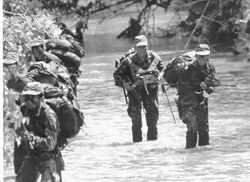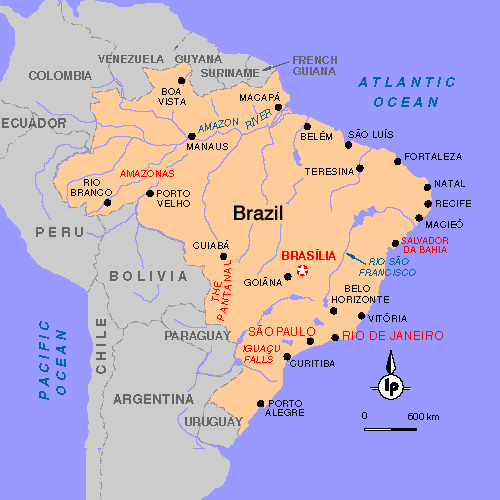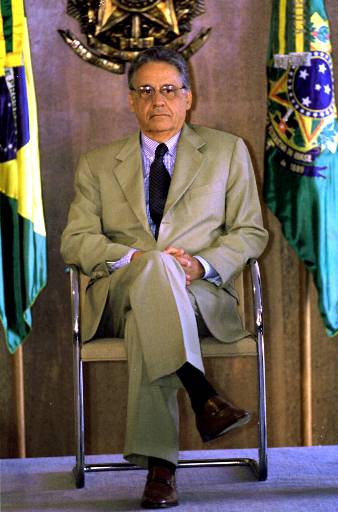TUESDAY (11/13)
IN CLASS:
Video: Kiss of the Spider Woman
Class Debate: Prosecute and Punish, or Forgive and Forget?
READINGS FOR WEEK 10
- Samuel P. Huntington, "The Torturer Problem" and "The
Praetorian Problem," in The Third Wave: 211-253.
- Alfred Stepan, Rethinking Military Politics: Brazil and the Southern
Cone: 68-127.
- Wendy Hunter, "Politicians Against Soldiers: Contesting the
Military in Post-Authoritarian Brazil," Comparative Politics,
July 1995, (27): 425-443.
- A. J. Langguth, Hidden Terrors: The Hidden Truth About U.S. Police
Operations in Latin America: 160-165.
- Freedom in the World, Chapter on Brazil
Recommended Readings (for debate):
Transitional Justice:
- Juan Mendez, ,"Accountability for Past Abuses," Human
Rights Quarterly, 19(1997): 255-282.
- Jose Zalaquett, "Balancing Ethical Imperatives and Political
Constraints: The Dilemma of New Democracies Confronting Past Human
Rights Violations," Hastings Law Journal, 43(August 1993):
1425-1438.
- Jamal Benomar, "Justice After Transitions," in Neil J.
Kritz, ed., Transitional Justice: How Emerging Democracies Reckon
with Former Regimes (Washington, D.C.: U.S. Institute for Peace,
1995): 32-41.
- Jamie Malamud-goti, "Transitional Governments in the Breach:
Why Punish State Criminals?" in Amnesty International, "Policy
Statement on Impunity," in Neil J. Kritz, ed., Transitional
Justice: How Emerging Democracies Reckon with Former Regimes (Washington,
D.C.: U.S. Institute for Peace, 1995): 189-202.
- Tina Rosenberg, "Overcoming the Legacies of Dictatorship,"
Foreign Affairs, May/June 1995, 74(3): 134-152.
- Amnesty International, "Policy Statement on Impunity,"
in Neil J. Kritz, ed., Transitional Justice: How Emerging Democracies
Reckon with Former Regimes (Washington, D.C.: U.S. Institute for
Peace, 1995): 219-221
Human Rights Abuses Under Military Rule:
- Lawrence Weschler, A Miracle, A Universe: Settling Accounts with
Torturers (Chicago: University of Chicago Press, 1998): 7-79.
- A.J. Languth, Hidden Terrors: The Truth About U.S. Police Operations
in Latin America (New York: Pantheon, 1978): 117-122.
- Jacobo Timmerman, Prisoner Without a Name, Cell Without a Number,
translated by Tony Talbot (New York: Vintage Books, 1982).'
Civil Military Relations:
- Juan Rial, "Armies and Civil Society in Latin America,"
in Larry Diamond and Marc F. Plattner, eds., Civil-Military Relations
and Democracy (Baltimore: Johns Hopkins University Press, 1996):
47-65.
- Eliezer Rizzo de Oliveira, "Brazilian National Defense Policy
and Civil-Military Relations in the Government of President Fernando
Henrique Cardoso," in Donald E. Schulz, ed., Conference Report:
The Role of the Armed Forces in the Americas: Civil-Military Relations
for the 21st Century (Carlisle, PA: Strategic Studies Institute,
U.S. Army War College, 1998): 31-69.
- Emilio Luis Bitencourt, "Civil-Military Relations in the Americas
for the 21st Century: A Latin American Perspective," in Donald
E. Schulz, ed., Conference Report: The Role of the Armed Forces
in the Americas: Civil-Military Relations for the 21st Century
(Carlisle, PA: Strategic Studies Institute, U.S. Army War College,
1998): 85-100.
Web Links:
|

Brazilian army patrol in the Amazon.

Map of Brazil

Brazilian president Fernando Henrique Cardoso.
|
![]()
![]()


